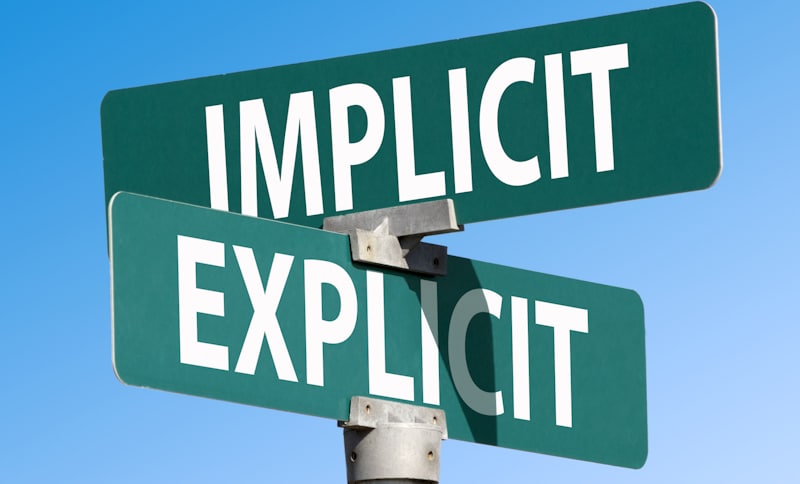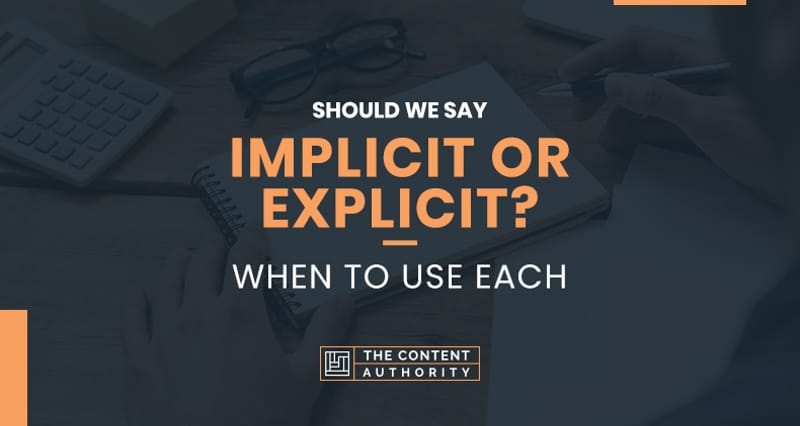One of the great things about the English language is the wide variety of word options you have to choose from. However, this can easily lead to confusion,due to the similarities between these words. One such time is with the use of “implicit” and “explicit.” So, should we say “implicit” or “explicit”? When to use each?
“Implicit” functions as an adjective that refers to something that is implied or not stated plainly and directly. On the other hand, “explicit,” also an adjective, refers to something explanatory, stated directly, and clear. At times, it might be too clear that it means offensive or vulgar language.
Still, there is more to understand about the use of both words. We have got you covered. This article will dive into when to use each word. This way, you have an in-depth understanding of the use of both words. Let’s get right to it!

When to and How to Properly Use “Implicit?”
The first step to understanding when to use the word “implicit” is to know its meaning. This is important because it not only offers you an insight into the nature of the word, but you also know what thoughts the word can convey. So, when do you use the word “implicit”?
Generally, the word “implicit” functions as an adjective. That is, when you use it within a sentence, what it does is qualify something, usually a noun. However, what meaning does it convey?
This word, related to the verb “imply,” refers to something that you do not state directly or plainly. That is something that you implied. So, when the message in something is not direct or cannot be obtained by merely looking but is implied, that message qualifies as implicit.
Typically, the use of this word has been popular over the years. It allows people to convey that a specific thought is more indirect rather than direct. So, now that we have the meaning all cleared up let us see some examples of the word. This will allow you to gain a further understanding of their usage.
- Implicit in Gary’s message was his disbelief in his ability to pull through at the upcoming competition. So, I think he might not be showing up at all for the competition.
- Although the patient was optimistic, in fact, like nothing we have ever seen before, the implicit truth in the doctor’s diagnosis is that Mary is very sick. From the message, it is clear that it will take a miracle for her to pull through.
Beyond this, you would remember that we stated that the word “implicit” is an adjective. Well, like most adjectives, it is possible to derive a new word from the word “implicit” through a suffix. In turn, by adding the prefix “ly,” you can derive the word “implicitly.”

In this case, the word is no longer an adjective. Instead, it is now an adverb that functions to qualify a verb. It describes how a particular action is performed by the noun. Here is an example that should help you get the hang of its usage.
- We should consider his statement implicitly; we might just be able to make some sense of it when we do so.
(As expected of an adverb, it modifies the verb in the sentence. Although the word “implicitly” arrives after the word “statement,” what it qualifies is the verb “consider.” It states how the members of the deliberation should perform their consideration, implicitly.)
When to and How to and How to Properly Use Explicit?
Now that we are clear on when and how to use the word “implicit,” let us dive into the use of the word “explicit.” Again, as you can expect, we will explain the meaning of the word. This is so you can have a foundation on which the knowledge of its usage can rest.
So, What Does The Word “Explicit” Mean?
You can view this word from the perspective that it is the opposite of the word “implicit.” As such, it means that something that you state clearly or plainly. In this instance, you can obtain the message without needing to derive it yourself. The speaker lays his message before you.
It also extends to the fact that one can easily understand the speaker’s message to the listener or reader. This is because the details in the message are without any form of uncertainty. In turn, the speaker provides the message with complete details that you can easily identify and grasp.
One thing you must keep in mind is that the word “explicit” is an adjective. Precisely, when in a sentence, it functions to describe the characteristics and quality of a noun. So, when you use it in a sentence, it must function to qualify a noun.
Now, here are some examples of how to use the words in a sentence. This will ensure that you gain a practical understanding of its use.
- The new song from Brian is, no doubt, an explicit declaration of love. You only need to listen to the first stanza to realize this; it was both wonderful and romantic.
- If there is one thing that stands Mary out, it is her explicit language even when she is pressured.
Also, the word “explicit” extends beyond an expression that is clear and easy to understand. It also expresses offensive or vulgar language. This is an extension of the first meaning of the word. However, the speaker is extremely clear and plain about something that becomes vulgar and offensive in this case.
For instance, when talking about some sexual activities, one might expect the speaker to be indirect and cautious with their statement. However, when such a speaker gets too plain and direct and lays everything bare, the statement might get regarded as offensive and vulgar. It would be okay to use the word “explicit” to describe such a statement or speaker in such cases.
Now, here are some examples that should help you bring the explanation above to life.
- I find Tyler’s favorite comedy to be too explicit for my liking; I wonder how he finds it cool.
- For something rated R, I believe there would be considerable use of explicit language than I would find comfortable. So, I would rather not watch the movie.
Now, just like with the word “implicit,” it is possible to derive a new word from the word “explicit.” This is through the use of a suffix “ly,” which creates a new word that falls under a different part of speech. Precisely, by adding the prefix “ly,” you can derive the word “explicitly.”
Here, the word is no longer an adjective. Instead, it is now an adverb that functions to qualify a verb. It describes how a particular action is performed by the noun. You can see the example below for a better understanding of its usage.
- I find myself speaking explicitly whenever I am with her; I have no idea how she gets me to do that every single time.
(In this instance, rather than the noun that the word “explicit” typically qualifies, the word “explicitly” qualifies a verb in this sentence. Precisely, the verb “speaking,” showing how the speaker talks.)

Understanding The Difference Between “Implicit” And “Explicit”
So far, one thing that has become clear is that there is no reason to confuse both words. They do not convey the same meaning. In fact, they are opposites, and you cannot use them interchangeably.
Still, we understand that remembering which word is which can be quite tricky. Hence, we have derived an easy way for you to remember which of them to use in a particular situation. Great right? Well, here you go.
When it comes to “implicit,” as we already stated, it means something that is implied. On the other hand, when it comes to “explicit,” it means something clear or explanatory. So, all you need to do is use the initial of what you want to convey to make a choice.
Precisely, if you want to state that something is explanatory, then you should go for the word “explicit.” All you need to remember is that both words start with the letter “e.” On the other hand, if you want to state that something is implied, then go for the word “implicit.” Again, all you need to remember is that they both start with the letter “i.”
By knowing this, you can now avoid the problem of confusing the use of both these words. Great right?
Final Thoughts
Should we say “implicit” or “explicit?” After reading this article is certain you have gotten the answer you deserved. After all, we are all particular about the correct usage of English words. No doubt, it might not appear very clear at first, but that does not have to be the case anymore.
Here we have taken time out to distinguish the words and how to use them. We have also explained how to remember the difference. So, read up and have fun using both words.
Shawn Manaher is the founder and CEO of The Content Authority. He’s one part content manager, one part writing ninja organizer, and two parts leader of top content creators. You don’t even want to know what he calls pancakes.

